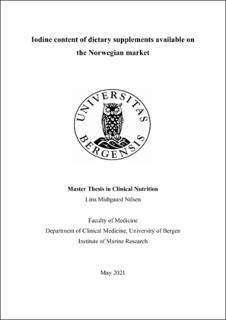Iodine content of dietary supplements available on the Norwegian market
Master thesis
Permanent lenke
https://hdl.handle.net/11250/2759438Utgivelsesdato
2021-05-18Metadata
Vis full innførselSamlinger
Sammendrag
Background: Insufficient iodine intake has been reported in groups of the Norwegian population. This is of concern, as iodine is an essential nutrient required throughout life. With few dietary sources of iodine, supplementation is recommended for individuals with a low intake of milk, dairy products and/or lean fish. However, no study has analysed the iodine content in supplements on the Norwegian market. Since legislation allows for deviation from labelled values of iodine content in dietary supplements, the use of these supplements could result in inadequate or excessive intake of iodine. Aim: To analyse iodine content in dietary supplements available on the Norwegian market and compare the results to the labelled content. Methods: Iodine containing dietary supplements were collected from pharmacies, health food stores, grocery stores, and online fitness stores in Norway. Three batches of each supplement product were purchased to account for variation in iodine content. During homogenisation and sample preparation, four samples from each batch were collected. Therefore, iodine was determined in a total of 12 samples from each supplement product by Inductively Coupled Plasma Mass Spectrometry. Mean analysed iodine content in each product was compared with the labelled iodine content. Results: A total of 52 supplements were included in the study, and 58% of the supplements were within ±10% of complete accordance with labelled iodine content. The mean iodine content of all supplements was 150 μg/recommended dose ± 60 μg/recommended dose, with minimum and maximum iodine of 32 μg/recommended dose and 421 μg/recommended dose, respectively. Two products were below the lower tolerance limit of -20% of labelled iodine content and two products exceeded the upper tolerance limit of +45% of labelled iodine content recommended by the European Commission. None of the supplements had iodine content below the minimum allowed iodine content of 23 μg per recommended daily dose. Conclusion: Our findings shows that the iodine content of approximately 60% of the supplements included in this present study is in accordance with the iodine content labelled on the product. However, the analysed iodine content of all included supplements was at a safe level and are unlikely to be harmful for most consumers. Yet, the labelling information of a few products could cause incorrect use of supplements and may result in excess iodine intake.
